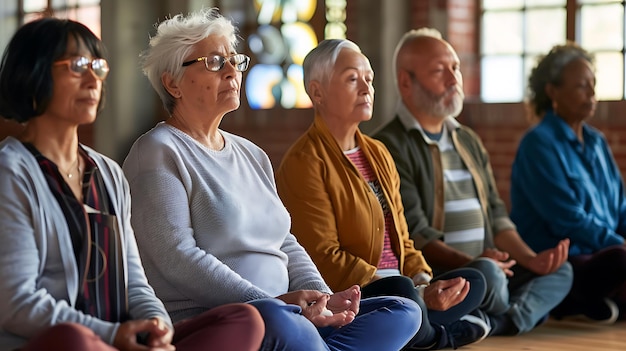The Role of Mindfulness & Meditation in Reducing Stress After 65

Mindfulness and meditation offer significant benefits for individuals over 65, effectively reducing stress and anxiety by promoting relaxation, improving emotional regulation, and enhancing overall mental well-being through consistent practice.
As we age, the challenges of life can sometimes amplify feelings of stress and anxiety. However, practices like mindfulness and meditation in reducing stress and anxiety after 65 can provide a powerful antidote, offering a path to greater calm and emotional well-being in the golden years.
Understanding Stress and Anxiety in Older Adults
Stress and anxiety are common experiences, but they can be particularly challenging for older adults. It’s important to understand the unique factors that contribute to increased stress and anxiety levels in this demographic.
Common Stressors for Seniors
Several factors can contribute to stress and anxiety in older adults, making it essential to recognize and address these issues effectively.
- Health Concerns: Managing chronic illnesses and dealing with physical limitations can be a significant source of stress.
- Financial Worries: Concerns about retirement funds, healthcare costs, and managing finances on a fixed income can cause anxiety.
- Social Isolation: Loneliness and lack of social interaction can lead to feelings of isolation and depression, exacerbating anxiety.
- Loss of Loved Ones: Grief and bereavement after the loss of a spouse, family member, or friend can significantly impact mental health.
Understanding these stressors is the first step in finding effective strategies to manage stress and anxiety.
Recognizing the triggers and understanding the root causes of your stress will help you to deal with it more effectively.
The Science Behind Mindfulness and Meditation
Mindfulness and meditation are ancient practices that have gained widespread recognition for their ability to reduce stress and anxiety. But what does the science say about their effectiveness?
How Mindfulness Works
Mindfulness involves paying attention to the present moment without judgment. This practice helps individuals become more aware of their thoughts, feelings, and sensations, allowing them to respond to stress with greater clarity and composure.
By focusing on the present, you can learn to accept difficult situations and react with greater resilience.
Benefits of Meditation
Meditation practices, such as focused attention or loving-kindness meditation, have been shown to reduce the activity of the amygdala, the brain’s fear center, and increase activity in areas associated with positive emotions. Studies confirm meditation enhances focus and reduce stress.

Overall, it promotes relaxation, reduces blood pressure, and improves sleep quality and provides a sense of calm and well-being.
Meditation can be a valuable tool for managing stress and promoting overall well-being.
Simple Mindfulness Exercises for Daily Life
Integrating mindfulness into your daily routine doesn’t have to be complicated. There are several simple exercises that can help older adults cultivate a greater sense of awareness and peace.
Mindful Breathing
This involves focusing on the sensation of your breath as it enters and leaves your body. Find a quiet place to sit, close your eyes, and gently observe your breath without trying to change it. When your mind wanders, gently guide your attention back to your breath.
Body Scan Meditation
Lie down or sit comfortably and bring your attention to different parts of your body, noticing any sensations without judgment. Start with your toes and gradually work your way up to the top of your head.
Mindful Walking
Pay attention to the sensation of your feet making contact with the ground as you walk. Notice the sights, sounds, and smells around you, fully engaging your senses in the present moment.
These exercises can be easily incorporated into daily life, providing moments of calm and clarity amidst the hustle and bustle.
Mindfulness exercises don’t require special equipment or training, making them accessible to everyone.
Meditation Techniques for Seniors
Various meditation techniques can be beneficial for older adults seeking stress relief. Understanding these techniques can help you find the one that best suits your needs and preferences.
Guided Meditation
Guided meditation involves listening to a recording that guides you through a meditation practice. These meditations often include visualizations, affirmations, and relaxation techniques. Many apps and online resources offer guided meditations specifically tailored for seniors.
Loving-Kindness Meditation
This practice involves cultivating feelings of love, compassion, and kindness towards yourself and others. Begin by focusing on yourself, then extend your feelings of kindness to loved ones, acquaintances, and eventually all beings.

Transcendental Meditation
This technique involves using a mantra to quiet the mind and promote deep relaxation. It requires instruction from a certified teacher and involves regular practice to achieve its full benefits.
Each of these meditation techniques offers unique benefits, so it’s worth exploring different options to find the one that resonates most with you.
Taking the time to learn different techniques can dramatically change the effects on the mind and body.
Creating a Consistent Practice
Consistency is key to experiencing the full benefits of mindfulness and meditation. Establishing a regular practice can help older adults manage stress and anxiety more effectively.
- Set a Specific Time: Choose a time of day when you are least likely to be interrupted and make it a regular part of your schedule.
- Start Small: Begin with just 5-10 minutes of mindfulness or meditation each day and gradually increase the duration as you become more comfortable.
- Create a Dedicated Space: Designate a quiet and comfortable space in your home where you can practice without distractions.
- Be Patient: It may take time to experience the full benefits of mindfulness and meditation, so be patient with yourself and don’t get discouraged if your mind wanders.
By making mindfulness and meditation a regular part of your routine, you can cultivate a greater sense of calm and well-being.
Consistency can profoundly impact physical and mental health.
Additional Tips for Managing Stress and Anxiety
While mindfulness and meditation are powerful tools, they are most effective when combined with other healthy habits. Consider incorporating these additional tips into your lifestyle.
Healthy Lifestyle Choices
Maintaining a healthy lifestyle can significantly reduce stress and anxiety levels. Regular exercise, a balanced diet, and adequate sleep are essential for overall well-being.
Exercise releases endorphins, which have mood-boosting effects, while a balanced diet provides the nutrients your brain needs to function optimally. Aim for at least 150 minutes of moderate-intensity exercise each week and focus on eating whole, unprocessed foods.
Social Support
Connecting with others can help combat feelings of loneliness and isolation, providing a sense of belonging and support. Join a senior center, volunteer in your community, or participate in social activities that you enjoy.
Professional Help
If stress and anxiety are significantly impacting your quality of life, consider seeking professional help from a therapist or counselor. Cognitive-behavioral therapy (CBT) and other therapeutic approaches can provide you with the tools and strategies you need to manage your symptoms effectively.
By combining mindfulness and meditation with these additional strategies, you can create a comprehensive approach to managing stress and anxiety in your later years.
Prioritizing mental health can improve overall quality of life significantly as one ages.
| Key Point | Brief Description |
|---|---|
| 🧘 Mindfulness | Focus on present moment awareness. |
| 🧠 Meditation | Quieting the mind for relaxation. |
| ⏰ Consistency | Regular practice enhances benefits. |
| ❤️ Social | Social connections reduce loneliness. |
Frequently Asked Questions
▼
Mindfulness is the practice of paying attention to the present moment without judgment. It involves being aware of your thoughts, feelings, and sensations as they arise, without getting carried away by them.
▼
Meditation promotes relaxation by reducing activity in the brain’s fear center (amygdala). It can enhance focus, improve sleep quality, and provide a sense of calm, reducing overall stress levels effectively.
▼
Aim for daily practice, even if it’s just for a few minutes. Consistency is key to experiencing the full benefits. Start with 5-10 minutes and gradually increase as you become more comfortable.
▼
It’s normal for your mind to wander. When you notice this happening, gently guide your attention back to your breath or chosen focus, without judgment. It’s all just part of the practice!
▼
Yes, guided meditation and loving-kindness meditation are often recommended. There are also resources that focus on techniques adapted for seniors with mobility or cognitive challenges.
Conclusion
Incorporating mindfulness and meditation into your daily routine can be a transformative experience, particularly for older adults seeking to reduce stress and anxiety. By taking small, consistent steps, you can unlock inner peace, improve your overall well-being, and embrace the golden years with greater calm and resilience.
